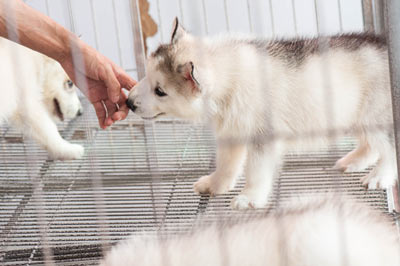Campylobacter Outbreak from Pet Store Puppies

As of early October 2017, at least 55 people have been stricken by campylobacteriosis in 12 states. Caused by the bacteria Campylobacter, authorities have traced this outbreak to puppies distributed and sold through Petland, a pet store chain. Thirteen of those people have had to be hospitalized.
Campylobacter is commonly found in the gut of normal dogs, but sometimes a pathogenic strain will appear, which can cause intestinal illness in dogs and also spread to humans.
What Are the Symptoms of Campylobacter Infection?
Humans infected with Campylobacter, which they get by contacting contaminated stool from an infected puppy, can develop symptoms beginning anywhere from 1-3 days after exposure. These can include:
- Diarrhea
- Vomiting
- Fever
- Abdominal pain
People are usually sick for up to 5 days, and the illness can be quite serious and even life-threatening in some instances.
Facts About 2017 Outbreak
Regarding the current outbreak, at the time of this writing in mid-October, 2017, the following is known or believed by authorities:
- 14 people who became sick were Petland employees.
- 35 people who became sick had direct contact with a puppy from Petland before becoming ill.
- Samples from humans and dogs infected during this outbreak have been resistant to multiple antibiotics.
- Dogs in a Petland breeding facility may have been fed contaminated food, leading to infection of the puppies during birth; those puppies were then distributed to many stores.
Tips for Pet Owners for Avoiding Campylobacter
Puppies and dogs can carry Campylobacter and other bacteria, viruses, and parasites that are transmittable to humans. The following advice should be adhered to in order to decrease your chances of contracting any of these from your dog:
- Always wash your hands thoroughly with warm, soapy water after handling your dog. Be especially mindful of monitoring that children do this.
- Don't allow a dog or puppy to lick your face or any areas of broken skin and teach your kids to avoid this, as well.
- If your dog shows signs of illness, take him to the veterinarian right away for diagnosis and treatment.
- Use disposable gloves to handle dog feces, and be sure to clean it up promptly whether it is inside or outside.
You May Also Like These Articles:
What Should You Do If Your Dog's Food Is Recalled?
A General Guide to Puppy Safety
Animal Cruelty: Signs and Prevention of Cruelty to Dogs
Dangers of Homemade Diets for Dogs
8 Ways Dogs Can Help People with Health Conditions
Disclaimer: This website is not intended to replace professional consultation, diagnosis, or treatment by a licensed veterinarian. If you require any veterinary related advice, contact your veterinarian promptly. Information at DogHealth.com is exclusively of a general reference nature. Do not disregard veterinary advice or delay treatment as a result of accessing information at this site. Just Answer is an external service not affiliated with DogHealth.com.
Notice: Ask-a-Vet is an affiliated service for those who wish to speak with a veterinary professional about their pet's specific condition. Initially, a bot will ask questions to determine the general nature of your concern. Then, you will be transferred to a human. There is a charge for the service if you choose to connect to a veterinarian. Ask-a-Vet is not manned by the staff or owners of DogHealth.com, and the advice given should not delay or replace a visit to your veterinarian.



